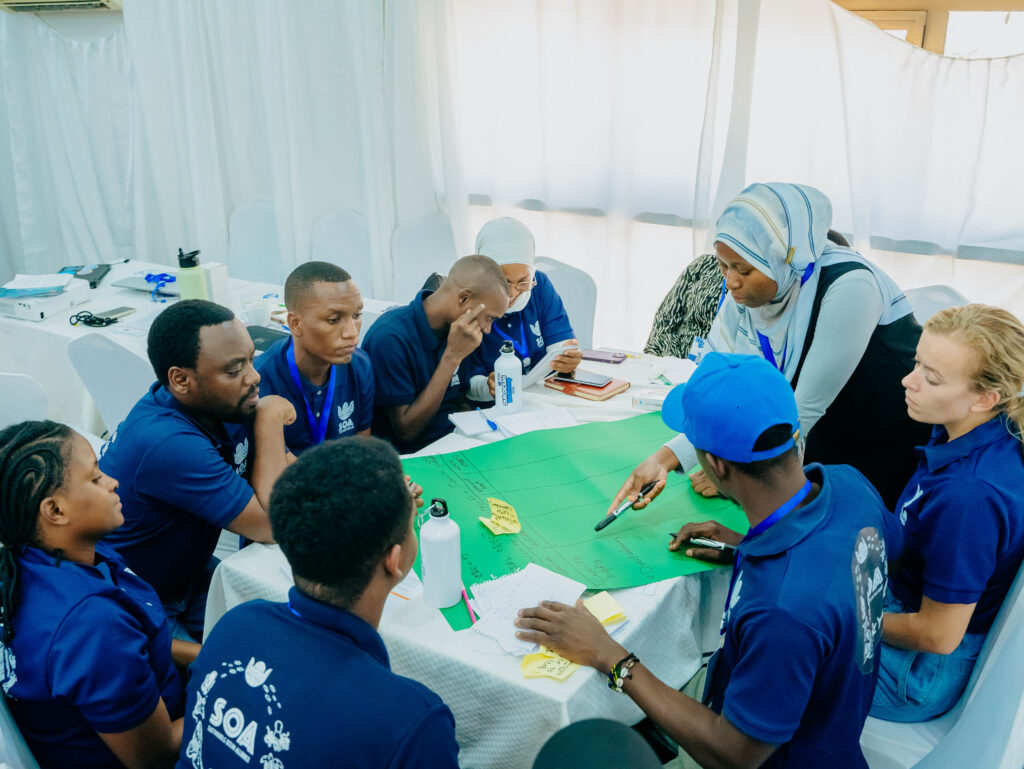During the Ocean Bootcamp 2024, Tanzanian youth leaders gathered to explore the 2024 Africa-Europe Foundation (AEF) Report, analyzing its impact on local environmental efforts and the wider African landscape. The discussions were centered on the report’s relevance to ocean conservation and the blue economy, recognizing its potential to drive sustainable development in coastal communities. Here’s how the youth leaders saw this collaboration unfold.

Relevance to Tanzania’s Environment and Africa
The 2024 AEF Report highlights critical priorities for ocean conservation and the blue economy, resonating strongly with the needs of Tanzanian communities. For instance, more than three million people in Tanzania depend on fisheries for their livelihoods. Educating the youth on sustainable fishing methods is essential to protect marine ecosystems and ensure long-term job security. The report’s recommendations for capacity building and financial support are crucial, particularly for coastal communities that often lack resources and expertise in sustainable ocean resource management.
As a country vulnerable to the impacts of climate change, Tanzania’s ratification of global treaties like the High Seas Treaty and the Plastic Treaty is vital. Active participation in dialogues such as the Ocean and Climate Dialogue at the UNFCCC COPs will help safeguard ecosystems. Moreover, the alignment of ocean governance policies between Africa and Europe presents exciting opportunities for young entrepreneurs in coastal communities, empowering them to engage more fully in the blue economy.
These initiatives are not just essential for Tanzania—they are key to promoting sustainable development across Africa.
Youth Engagement: Actions and Support Needed
At the Ocean Bootcamp 2024, young Tanzanians explored how they could take meaningful action based on the AEF report’s recommendations.
- Youth Involvement in Marine Governance
Tanzanian youth can play a significant role in marine governance, especially through AU-EU-supported partnerships. Youth involvement in monitoring local marine resources and participating in decision-making bodies can bring about positive change. - Local Implementation of Global Treaties
Young people can champion the local implementation of global treaties such as the Plastic Treaty to reduce pollution along the coast. In places like Bagamoyo, where fishing communities thrive, youth-led initiatives can focus on waste management and awareness campaigns about the harmful effects of plastic on marine life. However, for these activities to be effective, access to adequate resources and technologies is necessary. - Unlocking the Potential of the Blue Economy
To truly unlock the blue economy’s potential, Tanzanian youth need improved access to markets and resources. Youth leaders emphasize the importance of building local capacity to take advantage of sustainable economic opportunities in the blue economy sector. - Concrete Conservation Actions
Youth leaders called for concrete ocean conservation actions to restore marine health and sustainability. Empowering young people to take proactive steps toward ocean conservation is critical for preserving the planet.
Sustainable Finance
A key point from the 2024 AEF Report is the need for the African Union (AU) to secure its budget from internal sources. Relying on external funding for more than half of its budget delays climate solutions, as the AU must wait for donor funds, which are often disbursed according to donor priorities.
The report also calls for stronger oversight of global climate finance frameworks and expert task forces. Global financial institutions must prioritize climate solutions stemming from COP resolutions. This aligns with the current climate finance needs in Tanzania, where youth leaders called for greater access to finance for youth-driven actions and projects.
Moreover, the report underscores the importance of addressing debt relief for developing countries. Countries like Tanzania, struggling with the impacts of climate change, face high-interest debt repayments that hinder poverty eradication efforts. Debt swaps for climate action are essential, alongside standardized data reporting practices to ensure transparency in climate finance.
The EU’s Contribution to Science, Culture, and Education
The EU’s contribution to science, technology, and education is evident through initiatives such as satellite technology, which has greatly enhanced communication, weather forecasting, and disaster management across Africa. These advancements are critical for economic development and for preparing for the impacts of climate change.
Educational cooperation, such as exchange programs and university partnerships through initiatives like the EU’s Flagship Youth Mobility for Africa, also fosters innovation and supports the continent’s green transition. However, for lasting impact, there is a need for technology sharing and capacity building to equip local engineers with the skills to manage these advancements.
Cultural cooperation between Africa and Europe, such as the AU’s Great Africa Museum flagship project, showcases Africa’s rich cultural heritage. While the EU has supported cultural preservation in countries like Togo and Mozambique, challenges remain, including financial support and a lack of centralized reporting systems for art and cultural activities.
Call for Continued Partnership and Support
The youth leaders at the Ocean Bootcamp 2024 stressed the importance of expanding technical assistance and training programs. In regions like Bagamoyo, where sustainable fishing practices and marine conservation are critical, these partnerships can align local needs with global ocean governance frameworks.
Young ocean leaders also emphasized the need for enhanced communication channels to foster Africa-Europe collaborations, ensuring that youth are active participants in ocean protection initiatives. These partnerships offer Tanzanian youth the opportunity to benefit from strategic ocean governance efforts while contributing meaningfully to Africa-Europe relations.
Conclusion
The reflections from the Ocean Bootcamp 2024 underscore the need to turn commitments into tangible actions. Africa-Europe cooperation holds great promise, but formal agreements alone won’t bring about change. Real progress depends on active participation, accountability, and practical support.
By engaging young people, ensuring transparency, and providing access to resources, the Africa-Europe partnership can unlock transformative solutions that address ocean conservation, economic growth, and sustainable development for future generations.
Through continued collaboration and action, Tanzanian youth can play a pivotal role in shaping a sustainable blue economy and protecting the ocean for generations to come. The 2024 AEF Report offers a roadmap—now it’s up to the youth to drive the movement forward.
